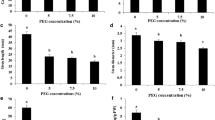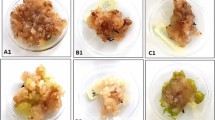Abstract
The induction of secondary metabolites under osmotic stress is well documented. However, cell death is probably due to osmotic stress. This work tries to study the synergetic effect of hydropriming and polyethylene glycol (PEG) on enhancing the secondary metabolites production in fenugreek callus cultures without facing cell death. PEG initiates the stress and the hydropriming increase the plant cell response against the stress. Fenugreek calli were initiated from hypocotyl of two groups of seeds, the first was hydroprimed overnight before germination, the second remained dry. Three months old calli of the two groups were subcultured on media containing two different concentration of PEG (5, 10%). The calli growth, biochemical analysis, secondary metabolism keys, and secondary metabolites were determined after 4 weeks. PE induced oxidative stress, which increased the membrane lipid peroxidation and decreased cell viability and growth. Hydropriming enhanced the activity of antioxidant enzymes, regulating the reactive oxygen species level, accumulating the osmolytes and secondary products. Therefore the primed callus can tolerate the osmotic stress initiated with PEG. Consequently, cell biomass increased and not affected by PEG treatment. On the other hand, the calli from non-primed seeds have a significant decrease in fresh weight, and dry weight under the higher PEG treatment. The hydropriming protected the growth of the cells under PEG treatment with a high content of secondary metabolites and high antioxidant machinery. The synergetic effect of hydropriming and PEG can be used as a simple and low-cost way to produce valuable compounds in commercial industrial bioreactors.
Key message
The synergetic effect of hydropriming and PEG enhances the secondary metabolites production in fenugreek callus. PEG initiates the stress and the hydropriming improves the plant cell response against the stress.






Similar content being viewed by others
Data availability
All data generated or analyzed during this study are included in this published article.
References
Abas ASM, Naguib DM (2019) Effect of germination on anticancer activity of Trigonella foenum seeds extract. Biocat Agric Biotech 18:101067. https://doi.org/10.1016/j.bcab.2019.101067
Ahmad A, Alghamdi SS, Mahmood K, Afzal M (2016) Fenugreek a multipurpose crop: potentialities and improvements. Saudi J Biol Sci 23:300–310. https://doi.org/10.1016/j.sjbs.2015.09.015
Akula R, Ravishankar GA (2011) Influence of abiotic stress signals on secondary metabolites in plants. Plant Signal Behav 6:1720–1731. https://doi.org/10.4161/psb.6.11.17613
Alexieva V, Sergiev I, Mapelli S, Karanov E (2001) The effect of drought and ultraviolet radiation on growth and stress markers in pea and wheat. Plant Cell Environ 24:1337–1344. https://doi.org/10.1046/j.1365-3040.2001.00778.x
Anjum SA, Ashraf U, Tanveer M, Khan I, Hussain S, Shahzad B, Zohaib A, Abbas F, Saleem MF, Ali I, Wang LC (2017) Drought induced changes in growth, osmolyte accumulation and antioxidant metabolism of three maize hybrids. Front Plant Sci 8:69. https://doi.org/10.3389/fpls.2017.00069
Bates LS, Waldren RP, Tear ID (1973) Rapid determination of free proline for water stress studies. Plant Soil 39:205–207. https://doi.org/10.1007/BF00018060
Beyer WF Jr, Fridovich I (1987) Assaying for superoxide dismutase activity: some large consequences of minor changes in conditions. Anal Biochem 161:559–566. https://doi.org/10.1016/0003-2697(87)90489-1
Bitarafan Z, Asghari HR, Hasanloo R, Gholami A, Moradi F, Khakimov B, Liu F, Andreasen Ch (2019) The effect of charcoal on medicinal compounds of seeds of fenugreek (Trigonella foenum-graecum L.) exposed to drought stress. Ind Crops Prod 131:323–329. https://doi.org/10.1016/j.indcrop.2019.02.003
Bochkov DV, Sysolyatin SV, Kalashnikov AI, Surmacheva IA (2012) Shikimic acid: review of its analytical, isolation, and purification techniques from plant and microbial sources. J Chem Biol 5(1):5–17. https://doi.org/10.1007/s12154-011-0064-8
Bueno P, Piqueras A, Kurepa J, Savouré A, Verbruggen N, Montagu MV, Inzé D (1998) Expression of antioxidant enzymes in response to abscisic acid and high osmoticum in tobacco BY-2 cell cultures. Plant Sci 138:27–34. https://doi.org/10.1016/S0168-9452(98)00154-X
de Castro KM, Batista DS, Silva TD et al (2020) Water deficit modulates growth, morphology, and the essential oil profile in Lippia alba L. (Verbenaceae) grown in vitro. Plant Cell Tissue Organ Cult. https://doi.org/10.1007/s11240-020-01766-w
DuBois M, Gilles KA, Hamilton JK, Rebers PA, Smith F (1956) Colorimetric method for determination of sugars and related substances. Anal Chem 28:350–356. https://doi.org/10.1021/ac60111a017
Gholizadeh A, Kohnehrouz BB (2010) Activation of phenylalanine ammonia lyases a key component of the antioxidative system of salt-challenged maize leaves. Braz J Plant Physiol 22:217–223. https://doi.org/10.1590/S1677-04202010000400001
Grieve CM, Grattan SR (1983) Rapid assay for determination of water soluble quaternary ammonium compounds. Plant Soil 70:303–307. https://doi.org/10.1007/BF02374789
Guo YY, Yu HY, Yang MM, Kong DS, Zhang YJ (2018) Effect of drought stress on lipidperoxidation, osmotic adjustment and antioxidant enzyme activity of leaves and roots of Lycium ruthenicum Murr. seedling. Russ J Plant Physiol 65:244–250. https://doi.org/10.1134/S1021443718020127
Gupta P, Sharma S, Saxena S (2015) Biomass yield and steviol glycoside production in callus and suspension culture of Stevia rebaudiana treated with proline and polyethylene glycol. Appl Biochem Biotechnol 176:863–874. https://doi.org/10.1007/s12010-015-1616-0
Harborne JB (1973) Phytochemical methods. A guide to modern technology of plant analysis, 2nd edn. Chapman and Hall, New York, pp 88–185
Jóźwiak-Żurek A, Kozłowska M, Nuc K (2011) Phenylalanine ammonia lyase under combined effects of enhanced UV-B radiation and allelopathy stress. Acta Biol Crac Ser Bot 53:73–78. https://doi.org/10.2478/v10182-011-0027-y
Julkunen-Tiitto R (1985) Phenolic constituents in the leaves of northern willows: methods for the analysis of certain phenolics. J Agric Food Chem 33:213–217. https://doi.org/10.1021/jf00062a013
Jyothi D, Koland M, Priya S, Puthenveetil JJ (2017) Formulation of herbal capsule containing Trigonella foenum-graecum seed extract for the treatment of diabetes. J Young Pharm 9:352–356. https://doi.org/10.5530/jyp.2017.9.70
Kar M, Mishra D (1976) Catalase, peroxidase, and polyphenol oxidase activities during rice leaf senescence. Plant Physiol 57:315–319. https://doi.org/10.1104/pp.57.2.315
Karimi N, Souri Z (2016) Antioxidant enzymes and compounds complement each other during arsenic detoxification in shoots of Isatis cappadocica Desv. Chem Ecol 32:937–951. https://doi.org/10.1080/02757540.2016.1236087
Li HS (2000) Principles and techniques of plant physiological biochemical experiment. Higher Education Press, Beijing
Li L, van Staden J (1998) Effects of plant growth regulators on the antioxidant systems in callus of two maiz cultivars subjected to water stress. Plant Growth Regul 24:55–66. https://doi.org/10.1023/A:1005954532397
Ma H, Song L, Shu Y, Wang S, Niu J, Wang Z, Yu T, Gu W, Ma H (2012) Comparative proteomic analysis of plants leaves of different salt tolerant soybean genotypes. J Proteom 75:1529–1546. https://doi.org/10.1016/j.jprot.2011.11.026
Masoabi M, Lloyd J, Kossmann J, van der Vyver C (2018) Ethyl methanesulfonate mutagenesis and in vitro polyethylene glycol selection for drought tolerance in sugarcane (Saccharum spp.). Sugar Tech 20:50–59. https://doi.org/10.1007/s12355-017-0524-8
Ming SY, ZhiDong Z, YaDong L, Wu L, Liu HG (2009) Effect of PEG stress on resistance of low bush blueberry callus. J Jilin Agric Univ 31(5):538–542
Minorsky PV (2002) Trigonelline: a diverse regulator in plants. Plant Physiol 128(1):7–8. https://doi.org/10.1104/pp.900014
Naguib DM (2018) Control of Fusarium wilt in wheat seedlings by grain priming with defensin-like protein. Egypt J Biol Pest Control 28:68. https://doi.org/10.1186/s41938-018-0073-9
Naguib DM (2019) Metabolic profiling during germination of hydro primed cotton seeds. Biocatal Agric Biotechnol 17:422–426. https://doi.org/10.1016/j.bcab.2018.12.025
Naguib DM, Abdalla H (2019) Metabolic status during germination of nano silica primed Zea mays seeds under salinity stress. J Crop Sci Biotechnol 22(5):415–423. https://doi.org/10.1007/s12892-019-0168-0
Pallab K, Tapan BK, Tapas KP, Ramen K (2013) Estimation of total flavonoids content (TPC) and antioxidant activities of methanolic whole plant extract of Biophytum sensitivum Linn. J Drug Deliv Ther 3:33–37. https://doi.org/10.22270/jddt.v3i4.546
Poovaiah BW, Leopold AC (1973) Deferral of leaf senescence with calcium. Plant Physiol 52:236–239. https://doi.org/10.1104/pp.52.3.236
Rao S, Jabeen FTZ (2013) In vitro selection and characterization of polyethylene glycol (PEG) tolerant callus lines and regeneration of plantlets from the selected callus lines in sugarcane (Saccharum officinarum L.). Physiol Mol Biol Plants 19:261–268. https://doi.org/10.1007/s12298-013-0162-x
Rösler J, Krekel F, Amrhein N, Schmid J (1997) Maize phenylalanine ammonia-lyase has tyrosine ammonia-lyase activity. Plant Physiol 113:175–179. https://doi.org/10.1104/pp.113.1.175
Sánchez-Rodríguez E, Moreno DA, Ferreres F, del Mar Rubio-Wilhelmi M, Ruiz JM (2011) Differential responses of five cherry tomato varieties to water stress: changes on phenolic metabolites and related enzymes. Phytochemistry 72:723–729. https://doi.org/10.1016/j.phytochem.2011.02.011
Sarmadi M, Karimi N, Palazón J, Ghassempour A, Mirjalili MH (2018) The effects of salicylic acid and glucose on biochemical traits and taxane production in a Taxus baccata callus culture. Plant Physiol Biochem 132:271–280. https://doi.org/10.1016/j.plaphy.2018.09.013
Sharma A, Shahzad B, Kumar V, Kohli SK, Sidhu GPS, Bali AS, Handa N, Kapoor D, Bhardwaj R, Zheng B (2019) Phytohormones regulate accumulation of osmolytes under abiotic stress. Biomolecules 9:285. https://doi.org/10.3390/biom9070285
Tanveer M, Shahzad B, Sharma A, Khan EA (2019) 24-Epibrassinolide application in plants: an implication for improving drought stress tolerance in plants. Plant Physiol Biochem 135:295–303. https://doi.org/10.1016/j.plaphy.2018.12.013
Thakur M, Bhattacharya S, Khosla PK, Puri S (2019) Improving production of plant secondary metabolites through biotic and abiotic elicitation. J Appl Res Med Arom Plants 12:1–12. https://doi.org/10.1016/j.jarmap.2018.11.004
Trease GE, Evans WC (1996) Phenols and phenolic glycosides in Trease and Evans Pharmacology and Biker. Tindall, London, pp 832–836. ISBN: 0702018996 9780702018992
Upadhyaya A, Sankhla D, Davis TD, Sankhla N, Smith BN (1985) Effect of paclobutrazol on the activities of some enzymes of activated oxygen metabolism and lipid peroxidation in senescing soybean leaves. J Plant Physiol 121:453–461. https://doi.org/10.1016/S0176-1617(85)80081-X
Yamada M, Morishita H, Urano K, Shiozaki N, Yamaguchi-Shinozaki K, Shinozaki K, Yoshiba Y (2005) Effects of free proline accumulation in petunias under drought stress. J Exp Bot 56:1975–1981. https://doi.org/10.1093/jxb/eri195
Yamaner O, Erdage B (2013) Effects of sucrose and polyethylene glycol on hypericins content in Hypericum adenotrichum. Eur Asian J Biosci 7:101–110. https://doi.org/10.5053/ejobios.2013.7.0.12
Yasar F, Uzal O, Ozpay T (2010) Changes of the lipid peroxidation and chlorophyll amount of green bean genotypes under drought stress. Afr J Agric Res 5(19):2705–2709
Zelaya IA, Anderson JAH, Owen MDK, Landes RD (2011) Evaluation of spectrophotometric and HPLC methods for shikimic acid determination in plants: models in glyphosate resistant and susceptible crops. J Agric Food Chem 59:2202–2212. https://doi.org/10.1021/jf1043426
Zhou J, Chan L, Zhou S (2012) Trigonelline: a plant alkaloid with therapeutic potential for diabetes and central nervous system disease. Curr Med Chem 19(21):3523–3531. https://doi.org/10.2174/092986712801323171
Acknowledgements
Dr. Deyala M. Naguib would like to show her great gratitude to her supervisor Professor Hegazy Sadik Hegazy, professor of physiology, for his effort, time and patience giving to her in her life and work.
Funding
This paper is self-funding and we did not take any funds from any organization or person.
Author information
Authors and Affiliations
Contributions
The authors contributed equally to this work.
Corresponding author
Ethics declarations
Conflict of interest
We declare that we have no competing interests.
Ethical approval
This research article does not contain any studies with human participants or animals performed by any of the authors.
Additional information
Communicated by Ali R. Alan.
Publisher's Note
Springer Nature remains neutral with regard to jurisdictional claims in published maps and institutional affiliations.
Rights and permissions
About this article
Cite this article
Alzandi, A.A., Naguib, D.M. Effect of hydropriming on Trigonella foenum callus growth, biochemical traits and phytochemical components under PEG treatment. Plant Cell Tiss Organ Cult 141, 179–190 (2020). https://doi.org/10.1007/s11240-020-01778-6
Received:
Accepted:
Published:
Issue Date:
DOI: https://doi.org/10.1007/s11240-020-01778-6




